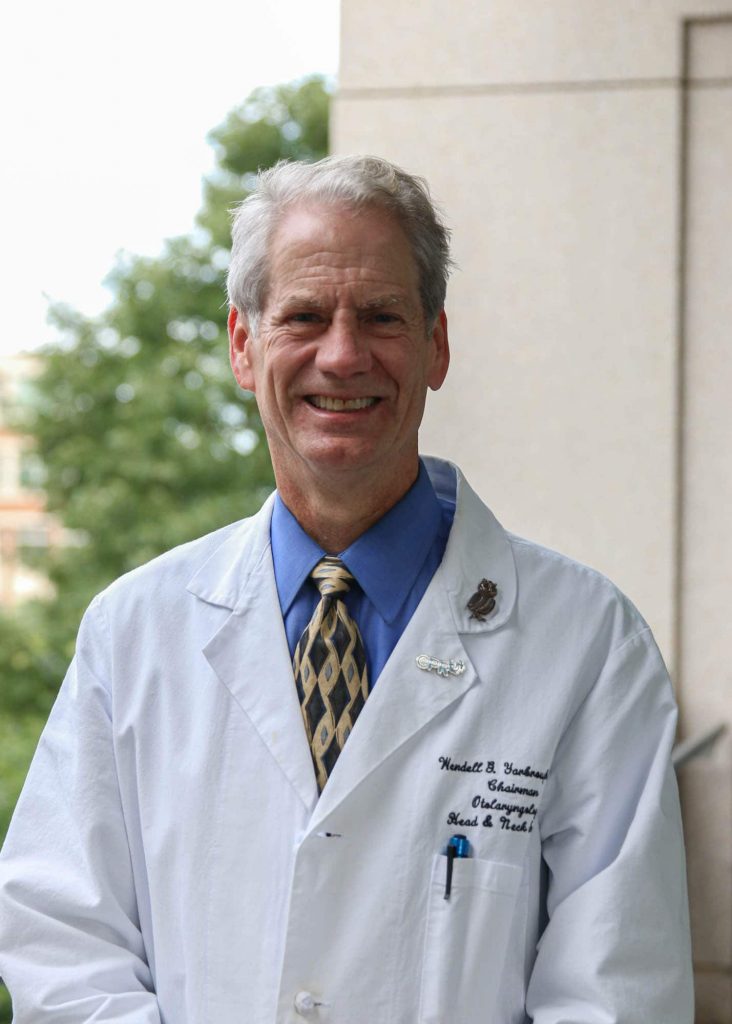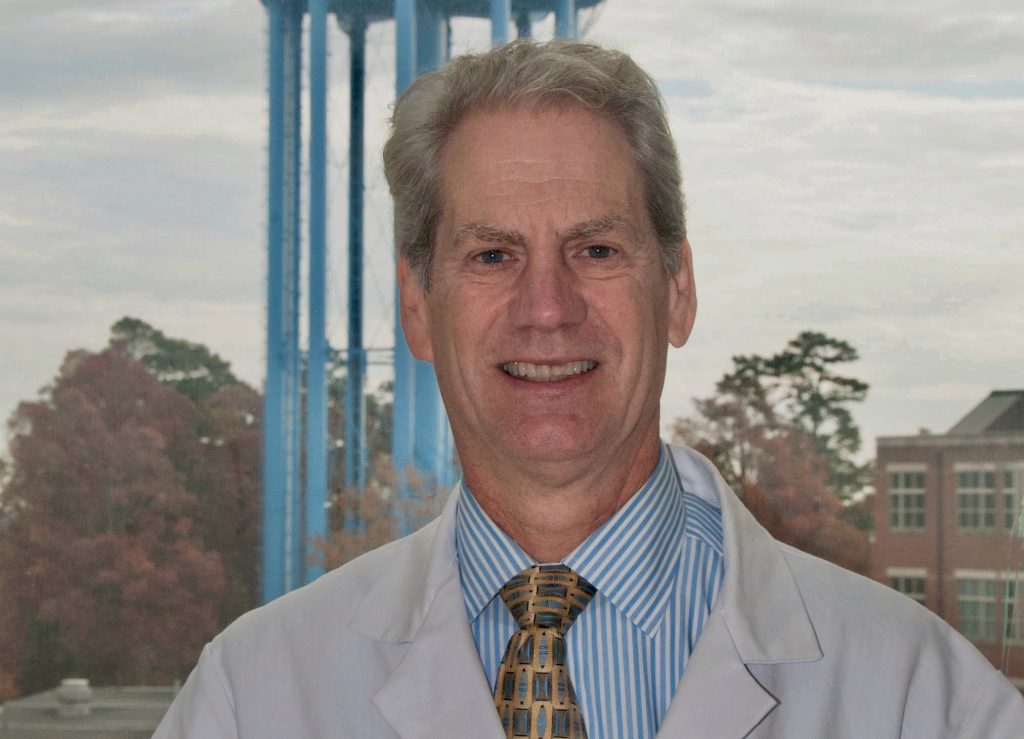A natural curiosity and drive to discover new things led Wendell Yarbrough, MD, MMHC, FACS, on the path to becoming a distinguished head and neck cancer surgeon and researcher studying potential new cancer therapies.
Yarbrough is a two-time Carolina alumnus who attended the University of North Carolina at Chapel Hill as an undergraduate, and then earned his medical degree at the UNC School of Medicine.

He returned to his alma mater in 2018 as chair of the UNC Department of Otolaryngology/Head and Neck Surgery and the Thomas J. Dark Distinguished Professor of Otolaryngology/Head and Neck Surgery.
He transitioned into the role after serving as section chief of otolaryngology in the Yale University School of Medicine Department of Surgery and director of the Head and Neck Disease Center at Smilow Cancer Hospital. He was also co-director of the Virus and Other Infection-Associated Cancers Program at the Yale Cancer Center.
“I think what really keeps me going is that I love what I do — the people I work with, and the mission we serve — taking care of the people of North Carolina, and pushing the boundaries of research, all of that mixed into one,” he said.
An early introduction to the lab
Growing up in Winston-Salem, Yarbrough said he was “always interested in science.” He also “played pretty much every sport they had” in high school. He swam on the swim team and played baseball, football and basketball.
He said he received a few football scholarships to other colleges, but he joked he gave up his football career to attend UNC-Chapel Hill on the prestigious Morehead-Cain scholarship. He was always a Tar Heel fan growing up and joked that he “hated Duke, still do.”
“Other than not being big enough, fast enough, or strong enough, I would have played football here,” Yarbrough joked.
At Carolina, he worked in a molecular endocrinology lab. It was there that he first learned that a doctor could also conduct research.
“That’s what set me up on that pathway,” he said.
Yarbrough went to medical school at UNC, and then completed his internship in general surgery at UNC in 1990, and his residency in the Department of Otolaryngology/Head and Neck Surgery in 1994.
He was drawn to surgery early on in his medical training. “I loved the pace of it, I loved that the results were pretty immediate,” he said. “Maybe I’m impatient; I don’t know. It just really spoke to me.”
I think what really keeps me going is that I love what I do — the people I work with, and the mission we serve — taking care of the people of North Carolina, and pushing the boundaries of research, all of that mixed into one."
Yarbrough’s career path took him from serving as an associate professor in the UNC School of Medicine with dual appointments in the departments of Otolaryngology/Head and Neck Surgery and Biochemistry/Biophysics to Vanderbilt Ingram Cancer Center. At Vanderbilt, he rose to the position of Barry and Amy Baker Chair in Laryngeal, Head and Neck Research. During his time at Vanderbilt, he also earned a business degree.
“I like doing a lot of things,” he said. After working at Yale, he returned to his alma mater.
“The caliber of the Department of Otolaryngology here and the collaborative nature of the people just made that a very easy decision for me,” Yarbrough said. “The chance to come back here and be the head of this department was really an opportunity that I just couldn’t pass up.”
Continued focus on research
Early on in his training as a surgeon, Yarbrough said he felt an internal conflict because people told him “you can’t be a surgeon and do research.”
“I did surgery anyway and still continue to do research,” he said.
As an undergraduate and later in medical school, Yarbrough studied genes in rabbits and rats involved in male sex development. He was part of a study that identified a genetic defect that resulted in animals that were genetically male but had female sex characteristics. The defect interfered with the rat’s ability to respond to androgen hormones, which are critical for male sexual development.

“We found a mutation in the androgen receptor that causes testicular feminization,” he said.
During his medical training, he worked in head and neck cancer research in a laboratory at GlaxoSmithKline in Research Triangle Park. Later as a fellow, he worked in a UNC lab studying a tumor suppressor protein called p16.
They found head and neck cancers with a mutation in the gene coding for the p16 protein. Without p16, the cells lacked a key braking mechanism to prevent them from moving forward toward cell division.
“Also, we found families in North Carolina that had a lot of head and neck cancer, and when we started tracking down what was going on in their families, we found that in their germline, they had defects in the p16 gene,” he said.
The finding that set Yarbrough’s career off was that one gene, called CDKN2a, codes for two different proteins – p16 and another called ARF – that both act as tumor suppressors.
“If you lose this one gene, you inactivate both (tumor suppressor proteins), so it’s one of the most commonly defective genes in human cancer,” Yarbrough said.
Yarbrough’s research interests shifted to head and neck cancers associated with the human papillomavirus, or HPV. His research evaluated the molecular characteristics of HPV-linked head and neck cancers — work that has led to clinical trials for potential new treatments.
“By understanding the molecular characteristics, we have found some Achilles’ heels of these tumors,” he said. “Being able to take what I do in the lab, and have it come out in the clinic is terribly exciting.”
Yarbrough said the effort to understand molecular characteristics of these cancers could help physicians tailor treatment for individual patients.
“It’s exciting that we might be able to take these markers, look at patients’ tumors before we treat them, and know which ones we need to treat less or more aggressively,” he said.
Across his career, he’s witnessed an “explosion” in scientific understanding of head and neck cancer.
Yarbrough said he’s “never been more hopeful for cancer patients.”
“The progress I see on clinical research and translational research is moving at a pace that is unbelievable,” he said, with new drugs approved for head and neck cancer, and innovative clinical trials underway.
His wife, Glen, is a book editor who “puts up with a lot” and who “keeps me from being a total nerd,” Yarbrough said. They recently adopted a dog, and have two sons, Miller and Gray.
